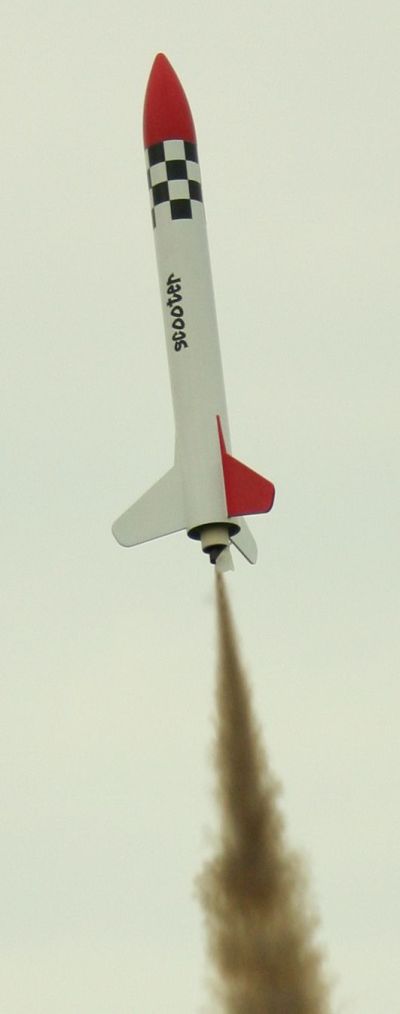| Published: | 2010-11-13 |
| Diameter: | 2.20 inches |
| Length: | 22.00 inches |
| Manufacturer: | Madcow Rocketry  |
| Skill Level: | 3 |
| Style: | Sport |
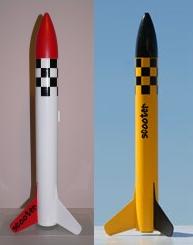 (08/25/08) The Madcow Scooter™ is a
classic-looking, stubby rocket with the capability of flying on D12's. From another view, the Scooter™ is a 29mm,
mid-powered, solid-construction rocket that can reach 2,260 feet on a G64.
(08/25/08) The Madcow Scooter™ is a
classic-looking, stubby rocket with the capability of flying on D12's. From another view, the Scooter™ is a 29mm,
mid-powered, solid-construction rocket that can reach 2,260 feet on a G64.
Overall, the Scooter™ is an easy rocket to build and other than the balsa nose cone it finishes just as easy. You can do a lot with your paint schemes and still incorporate the checker-board and name decals. On Madcow's website, the Scooter™ has an attractive yellow/black paint scheme (far right), whereas, I chose different colors.
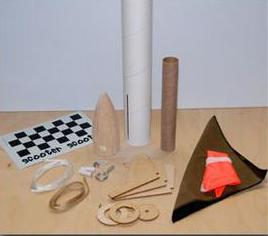 The rocket includes a pre-slotted 17" long, 2.2" diameter body tube. Add to that,
three through-the-wall laser-cut plywood fins and a 4.4" long balsa nose cone to make up the 22" length. The
recovery system includes a Kevlar®
shock-tether, a nylon shock cord, a Nomex®
parachute protector, and an 18" rip-stop nylon parachute.The remainder of parts include laser-cut plywood
centering rings, eye-bolt (with nut and washers), a 29mm motor tube, two 1/4" launch lugs, and lastly water-slide
decals. (parts picture to left courtesy of Madcow)
The rocket includes a pre-slotted 17" long, 2.2" diameter body tube. Add to that,
three through-the-wall laser-cut plywood fins and a 4.4" long balsa nose cone to make up the 22" length. The
recovery system includes a Kevlar®
shock-tether, a nylon shock cord, a Nomex®
parachute protector, and an 18" rip-stop nylon parachute.The remainder of parts include laser-cut plywood
centering rings, eye-bolt (with nut and washers), a 29mm motor tube, two 1/4" launch lugs, and lastly water-slide
decals. (parts picture to left courtesy of Madcow)
CONSTRUCTION:
The instructions are printed in a small booklet of 4 pages. This is a very easy rocket to build and a nice introduction to mid-power rocketry. The techniques used are described well in text and there are some illustrations to ensure understanding.
The instructions say to use 5-minute epoxy throughout the build, however, I built mine with wood glue (other than the fin fillets).
The motor mount is built first. It is a typical build but care must be taken to follow the instructions so the through-the-wall fins fit correctly. The Kevlar® shock-tether is tied around the motor tube and fed past the upper centering ring through a notch.
The fins are next and as mentioned they are through-the-wall mounted to the motor tube. Easy stuff here especially with the pre-slotted body tube.
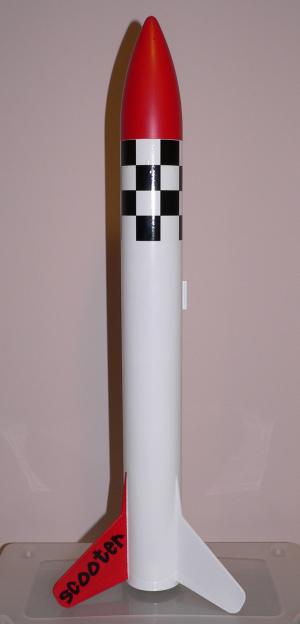 The nose cone is assembled next. Madcow suggests adding nose weight if needed to have your CG
at 20.75" from the nose tip. Since I was shipping this to NARAM-50, I didn't want any surprises so I filled the
bore hole in the nose cone with BB's, poured in some Gorilla polyurethane glue, and added the eye-screw and plywood
bulkhead. Apparently I added a lot of weight since my rocket weighed in at 10.2 ounces verses Madcow's estimate of 6
ounces.
The nose cone is assembled next. Madcow suggests adding nose weight if needed to have your CG
at 20.75" from the nose tip. Since I was shipping this to NARAM-50, I didn't want any surprises so I filled the
bore hole in the nose cone with BB's, poured in some Gorilla polyurethane glue, and added the eye-screw and plywood
bulkhead. Apparently I added a lot of weight since my rocket weighed in at 10.2 ounces verses Madcow's estimate of 6
ounces.
Normally for balsa nose cones I use many, many coats of Plasti-Kote Primer and sand in between each coat. For the Scooter™ I used DecoArt's Multi-Purpose Sealer. I used about 3 coats of it by applying it with a foam brush and sanding inbetween coats. Then I used Plasti-Kote Primer on the whole rocket, sanding in-between coats to get a smooth finish. This was followed by using Krylon's white and red paint.
I must have done a good job (and I did) because many commented on how smooth the nose cone looked. One person said it looks like it is plastic.
The decals were then applied and voila'... a good looking Scooter™.
Overall, for CONSTRUCTION I would rate this kit 5 points. Build sequence and quality/fit of parts was excellent. Instructions are simple and easy to follow. Decals make for a nice finish, especially the checker-board one.
Madcow lists a whole slew of recommended motors ranging from D12-5 and E9-4 (with 24mm adapter) up to G40-7 and G64-7. They indicate that the D12-5 should get about 500 feet altitude while the G64 should push the Scooter™ to 2,260 feet.
As mentioned earlier, Madcow indicates that the rocket should weigh about 6 ounces with a CG at 20.75" from the nose tip.
My finished rocket weighed in at 10.2 ounces with a CG at 10" from the nose cone. My attached RockSIM has a mass object to simulate my finished rocket. If you use this for testing you may need to adjust it for your finished rocket.
I shipped this rocket to NARAM since I was only going to be there a day or so. This plan included buying motors at the site. When I arrived on Thursday afternoon I was able to buy a two-pack of F23-7's.
The first flight went off perfectly. Nice and straight. From my angle the ejection looked to be perfectly at apogee. RockSIM says a 6-second delay would be optimal. Look at this awesome shot (left) that Chris Taylor took from his great site NARAM LIVE! You can click on it to enlarge it.
The rocket landed about 150 yards from the launch area. I took a picture of it on the ground (below) showing off the RocketChutes.com Tie-Dye parachute that I used. (I replaced the 18" rip-stop nylon 'chute provided by Madcow with this 18" rip-stop 'chute... performance would be equal). Notice the Nomex® parachute protector.
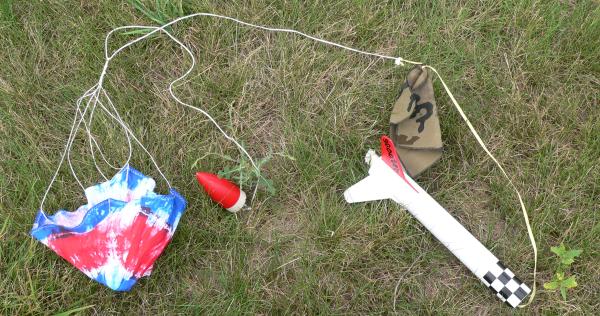
The second flight was on the other F23-7. Caught this one on the my camera's video (so not the best quality). Interestingly, the flight was again perfect and it landed within inches/feet of the previous flight!
The next day, I purchased an Aerotech G77-7 to fly the Scooter™. The wind was carrying rockets into the neighboring area and I didn't want to loose this one, so I reefed the 'chute about half-way up the shroud lines. (I seem to do this on a lot of rockets).
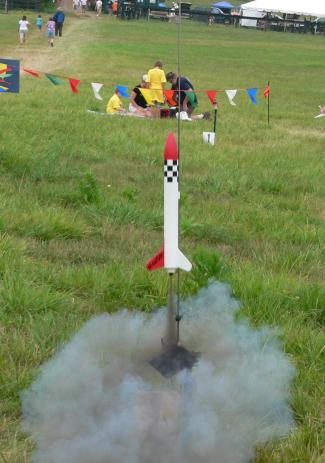 I didn't say it, but one of the observers said (without intending to make the pun), "Boy
that really scooted on that Redline!". And it did. RockSIM says to about 2,050 feet. The deployment was early, but
recovery system held together and the rocket recovered nicely.
I didn't say it, but one of the observers said (without intending to make the pun), "Boy
that really scooted on that Redline!". And it did. RockSIM says to about 2,050 feet. The deployment was early, but
recovery system held together and the rocket recovered nicely.
For FLIGHT/RECOVERY, I would rate this rocket 4 ½ points. The Kevlar® to nylon shock cord system is excellent along with the Nomex® parachute protector and nylon parachute. There is no motor retention.
I give the rocket an OVERALL rating of 5 points. I would recommend it as an excellent transition kit from low-power to mid-power. I also prefer this "size" of rocket and look forward to many flights. Some might ding it for the balsa nose cone, however, I don't mind finishing them and they are easy to repair when dinged. I would like to see a motor hook added to further support my recommendation for it to be a transition kit. Adding the 24mm adapter wouldn't be a bad idea either.
All-in-all, I would say that the Madcow Scooter™ is an excellent kit.
 |
 |
Flights
 |
 |
